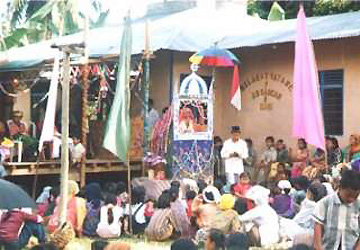| 10. Hot Debates On two occasions this year, in February and in July of 2000, ASAFAS held its first hearings of pre-doctoral theses. Of the 23 students who entered the School at its opening in1998, eight students at the second-year stage and two students at the two-and-a-half year stage presented their pre-doctoral theses. Happily, all those who presented were judged successful. It might be noted that in the interval, one student for various reasons dropped out of school and is now employed in a private sector. It might be considered that the number of those who presented theses is a little small, but there were several people who were either doing fieldwork for a year or had gone abroad for language studies from the beginning of their freshman year, and including them, there are many students who are weighing a good timing to present their pre-doctoral theses within the framework of the five-year doctoral program. Some of the titles of the theses that were presented are as follows:
The public hearings of the students’ pre-doctoral theses, together with the required courses, i.e., Introduction to Area Studies and the Seminar on Asian and African, provide the only opportunity for all members of ASAFAS, students and staff included, to meet together. Each pre-doctoral thesis presentation lasts for 20 minutes, and the question-and-answer session lasts for 15 minutes. The meeting is not run on formality. In the question-and-answer session, many different views fly about and sometimes hot debates develop among faculty members, ignoring the students. This is probably only natural. This is a school that contains many different views concerning the practice of area studies. It is necessary to devise ways to raise the quality of discussions to a constructive level and further involve students in the discussions, but I believe that we must continue to encourage a really enthusiastic exchange of opinions that cuts across the divisions and departments. If the public hearings were to become a merely ceremonial affair, that would probably signify a regressive turning point for ASAFAS.
KATO Tsuyoshi |
